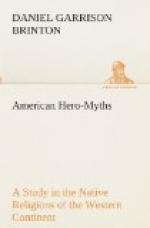The actual religious and moral progress of the natives was designedly ignored and belittled by the early missionaries and conquerors. Bishop Las Casas directly charges those of his day with magnifying the vices of the Indians and the cruelties of their worship; and even such a liberal thinker as Roger Williams tells us that he would not be present at their ceremonies, “Lest I should have been partaker of Satan’s Inventions and Worships."[1] This same prejudice completely blinded the first visitors to the New World, and it was only the extravagant notion that Christianity had at some former time been preached here that saved us most of the little that we have on record.
[Footnote 1: Roger Williams, A Key Into the Language of America, p. 152.]
Yet now and then the truth breaks through even this dense veil of prejudice. For instance, I have quoted in this chapter the evidence of the Spanish chroniclers to the purity of the teaching attributed to Bochica. The effect of such doctrines could not be lost on a people who looked upon him at once as an exemplar and a deity. Nor was it. The Spaniards have left strong testimony to the pacific and virtuous character of that nation, and its freedom from the vices so prevalent in lower races.[1]
[Footnote 1: See especially the Noticias sobre el Nuevo Reino de Granada, in the Colleccion de Documentos ineditos del Archivo de Indias, vol. v, p. 529.]
Now, as I dismiss from the domain of actual fact all these legendary instructors, the question remains, whence did these secluded tribes obtain the sentiments of justice and morality which they loved to attribute to their divine founders, and, in a measure, to practice themselves?
The question is pertinent, and with its answer I may fitly close this study in American native religions.
If the theory that I have advocated is correct, these myths had to do at first with merely natural occurrences, the advent and departure of the daylight, the winds, the storm and the rains. The beneficent and injurious results of these phenomena were attributed to their personifications. Especially was the dispersal of darkness by the light regarded as the transaction of all most favorable to man. The facilities that it gave him were imputed to the goodness of the personified Spirit of Light, and by a natural association of ideas, the benevolent emotions and affections developed by improving social intercourse were also brought into relation to this kindly Being. They came to be regarded as his behests, and, in the national mind, he grew into a teacher of the friendly relations of man to man, and an ideal of those powers which “make for righteousness.” Priests and chieftains favored the acceptance of these views, because they felt their intrinsic wisdom, and hence the moral evolution of the nation proceeded steadily from its mythology. That the results achieved were similar to those taught by the best religions of the eastern world should not excite any surprise, for the basic principles of ethics are the same everywhere and in all time.




